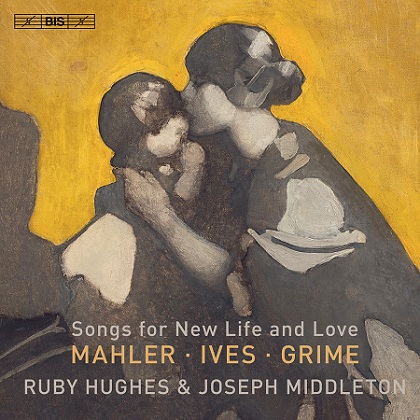At first glance Charles Ives and Gustav Mahler make unusual bed fellows. But on this excellent CD from BIS they flank a song cycle by Helen Grime to form a programme focussing on timeless concerns of love and loss, pregnancy and parenthood. It’s a serious and thought-provoking concoction entitled Songs for New Life and Love, to which Ruby Hughes and Joseph Middleton fashion utterly beguiling performances that will surely make for one of this year’s most rewarding and repeatedly played recordings.
Two of Mahler’s song collections form the lion’s share of the disc, its consolatory mood set in motion from the very first bars of Lieder eines fahrenden Gesellen. In ‘Wenn mein Schatz Hochzeit macht’ the wayfarer’s emotional unrest is captured ideally by Hughes’s elegant soprano. Hers is a light voice, supple and with a natural sensitivity to words. By the end of the opening phrase her tiny hesitation over ‘Hochzeit’ (wedding) is just one indication of these lovingly detailed and affectionate performances. There’s something vernal in her ‘Ging heut’ morgen über’s Feld’, where the journeyman’s encounter with nature perfectly matches Hughes’s fresh delivery. She takes full advantage of the drama in ‘Ich hab’ ein glühend Messer’, although its despair generates a slight shrillness at the top of her register. But there’s no denying the consoling tone she summons for the funeral march that is ‘Dei zwei blauen Augen von meinem Schatz’. One might miss the woodwind palette from the orchestral version, but Middleton colours these accounts with subtle touches and a sure sense of line.

If these four songs are allegedly based on Mahler’s own unrequited love for a soprano at the opera house in Kassel, then his uncompromising Kindertotenlieder of 1904 reflect memories of his childhood when several of his brothers died in infancy and foreshadow the death of his own daughter two years later. To texts by Friedrich Rückert, these grief-stricken settings might be viewed as an expression of Mahler’s morbid neuroses. In the traversal from numbed isolation to tentative spiritual solace, Hughes joins a distinguished group of interpreters and holds her own with the best of them. Throughout, she is a comforting presence, pure toned in the emptiness of ‘Nun will die Sohn’ so hell aufgehn’ and maternal in ‘Nun seh’ ich wohl warum so dunkle Flammen’ where ‘Augen’ and ‘Sterne’ (eyes and stars) are imbued with such beauty, one might forget how heart-rending these verses are. A little more weight and colour wouldn’t go amiss in the distraught ‘Wenn dein Mütterlein tritt zur Tür herein’ or dramatic urgency in the storm-tossed ‘In diesem Wetter, in diesem Braus!’, but ‘Oft denk’ ich, sie sind nur ausgegangen’ charms for its diaphanous phrasing.
Confronting childhood death must be a harrowing experience, but the selection of five poems about childbirth and being a parent by Fiona Benson for Grime’s Bright Travellers (2018) offers no idealistic assumptions of motherhood. It’s a warts and all portrait that navigates a path through the unease of a first scan, ‘Soundings’, to registering the birth in a disturbing visit to the ‘Council Offices’ where we encounter mothers whose children are stillborn. In between, ‘Brew’, outlines the magical transformation of a new being in the womb, ‘Visitations’ evokes postnatal depression, while ‘Milk Fever’ summons graphic images of breast feeding. At times angular, spare and hauntingly beautiful, the music’s quiet complexities and expressive variety are negotiated by Hughes and Middleton in an involving account that will make this fine partnership a natural choice for more of Grime’s songs.
Song-writing played a central role in the career of the eccentric Charles Ives, and his collection of 114 songs (privately printed at his own expense in 1922) represents about 70% of his total oeuvre. Here, just five from that anthology are presented and variously relate to the transience of life, memory and childhood. From the bi-tonal languor of ‘The Housatonic at Stockbridge’, Hughes moves on to the impressionistic elegy of ‘Mists’, while the gentle musing of ‘Serenity’, largely built on the rotation of two chords, sets words by the Quaker poet John Greenleaf Whittier, associated with the hymn text ‘Dear Lord and father of mankind’. To these songs Hughes responds with extraordinary delicacy, memorably heart-easing in the poignancy of ‘The Children’s Hour’ and the childlike simplicity of ‘Songs my Mother taught me’. Spinning the finest silk thread, Hughes will move you to tears each time you hear these songs. And as a night cap, she adds Huw Watkins’s classy arrangement of the Welsh lullaby ‘Suo Gân’.
David Truslove
Ruby Hughes (soprano) and Joseph Middleton (piano)
Mahler: Lieder eines fahrenden Gesellen, Kindertotenlieder; Ives: ‘The Housatonic at Stockbridge’, ‘Mists’, ‘Serenity’, ‘The Children’s Hour’, ‘Songs my Mother taught me’; Grime: Bright Travellers; Trad. (arr. Watkins): ‘Suo Gân’
BIS 2468 [74.12]